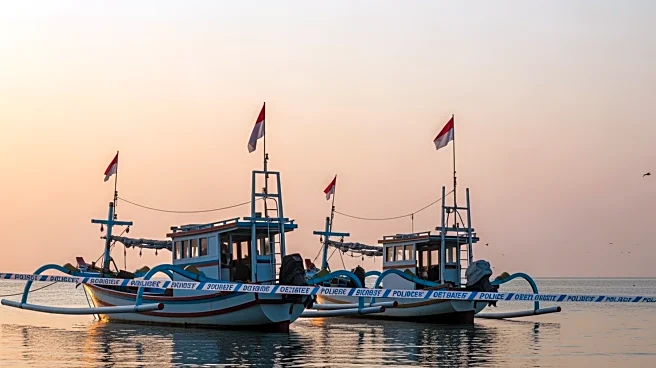What's Happening?
Six Indonesian nationals have pleaded guilty to illegally fishing in Australian waters, as reported in three separate cases at Darwin Local Court. The incidents occurred between September 27 and October 7, 2025, near various locations in Western Australia.
Australian authorities intercepted and apprehended the vessels, seizing significant quantities of sea cucumber, salt, and fishing equipment. The vessels were subsequently destroyed in accordance with Australian law. The masters of the vessels faced fines ranging from $7,000 to $10,000, while one was sentenced to 15 weeks of imprisonment due to prior offenses. The remaining crew members were fined $3,000 each, with all fines payable within 28 days. The fishers will be deported to Indonesia after serving their sentences.
Why It's Important?
This case highlights ongoing challenges in enforcing maritime laws and protecting marine resources in Australian waters. Illegal fishing poses a threat to the sustainability of marine ecosystems and the livelihoods of legal fishers. The prosecution of these individuals serves as a deterrent to future illegal activities and underscores the importance of international cooperation in maritime law enforcement. The fines and imprisonment reflect the seriousness of the offenses and the commitment of Australian authorities to uphold the Fisheries Management Act.
What's Next?
Following the court's decision, the Indonesian fishers will be deported after serving their sentences. Australian authorities may continue to enhance surveillance and enforcement measures to prevent illegal fishing activities. This could involve increased patrols and collaboration with neighboring countries to address cross-border fishing violations. The case may also prompt discussions on strengthening international agreements to protect marine resources.
Beyond the Headlines
The repeated offenses by some individuals suggest a need for more effective rehabilitation and education programs for fishers in Indonesia. Addressing the root causes of illegal fishing, such as economic pressures and lack of awareness, could reduce recidivism. Additionally, the destruction of vessels raises questions about the environmental impact and the potential for alternative penalties that focus on restoration and conservation efforts.















